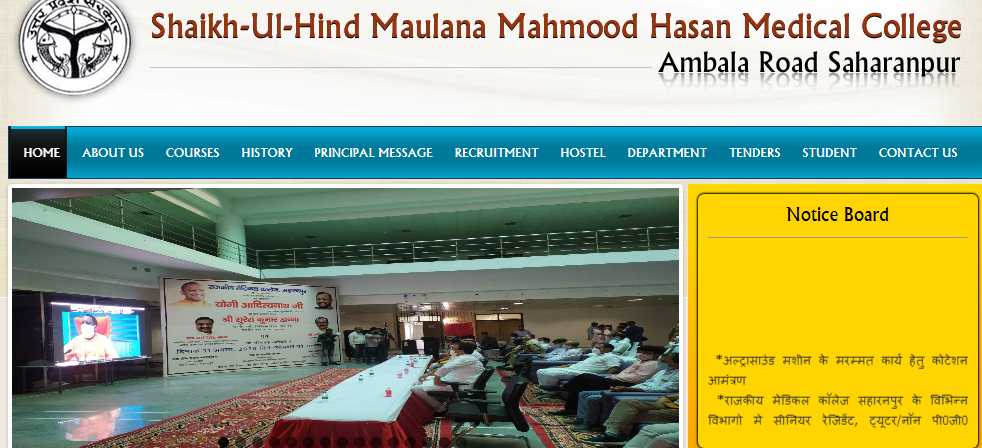
Shaikh-UL-Hind Maulana Mahmood Hasan Medical College, Saharanpur
The purpose of state medical college eduction policy is to provide healthcare for all citizens of the state and to train students. At present there are 61655 trained medical manpower in the state as per doctors registererd with State Medical Council Of India. The doctor population ratio in the state is 1:3456. The catchment area of this medical college shall be urban and rural population of Distt. Saharanpur, Muzaffarnagar in UP and near by Yamuna Nagar , Kurusheshtra, Karnal and panipat in Haryana .
The present medical college shall have a hospital having 500 bed strength with road access on Saharanpur Ambala National Highway. After approval from Medical Council of India, New Delhi. 400 MBBS Students have taken admission in this medical college.
Toll Free : 18002702259
Contact : 0132-2971155
Anti Ragging Committee.
Dr. Sandeep Kumar-Member-9411642494
Dr. Pankaj Kumar Verma-Member-9005332582
Dr. Virendra Singh Saini-Member-8858817111
Dr. Bipul Chandra Kalita- 9536704483
Dr. Neha Gupta- 8171449151
Dr. Renu Sharma- 8006677887
Anti Ragging Squad.
Dr. Pragya Shakya-Member- 8928937475
Dr. Manu Kapil- 9760199978
Dr. Ravi Agrawal- 9582910258
Dr. Deepak Kumar Verma- 9454529527
Dr. Anshuman Tiwari- 9839221512
Dr. Ankur Pathak- 8077466410
M.B.B.S.

Bachelor of Medicine, Bachelor of Surgery (Latin: Medicinae Baccalaureus, Baccalaureus Chirurgiae; abbreviated in many ways, most commonly MBBS, but also MB ChB, BMBS, MB BCh, MB BChir), is the primary medical degree awarded by medical schools in countries that follow the tradition of the United Kingdom. The historical degree nomenclature states that they are two separate undergraduate degrees. In practice, however, they are usually combined as one and conferred together, and may also be awarded at graduate-level medical schools.
Bachelor of Medicine and Bachelor of Surgery (MBBS), is a professional degree in medical science. A person holding the MBBS degree becomes a certified medical practitioner. The duration of MBBS course is five years and six months including one year of rotational internship at hospitals, health centres, and health camps organised by non-profit organisations (NGOs). MBBS course syllabus includes studies on anatomy, pharmacology, pathology as well as community health & medicine, paediatrics, and surgery. The syllabus, prescribed in such a way that MBBS degree holders can choose a specialisation for further majoring and practising medicine. The career specialisations for MBBS students are Nephrology, Cardiology, Gynecology, Anesthesiology, Organ Transplant, Endocrine, and General Surgery, etc.
- Log in to post comments
- 391 views
